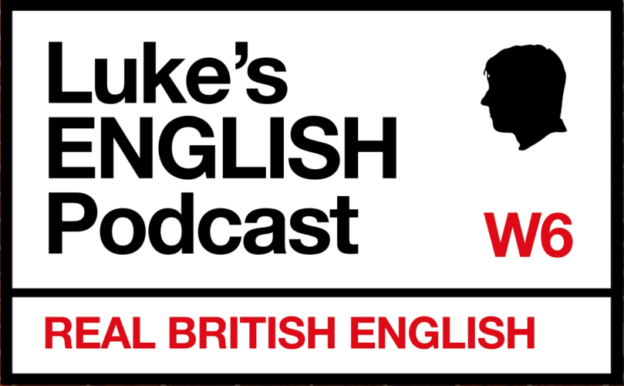Rambling (in my sweltering hot flat) about the benefits of playing football, giving encouragement to a shy new listener, some prepositions with transport, comparing formal and informal styles and commenting on the risks of using humour in emails.
[DOWNLOAD]
Notes & Transcriptions Below
It’s evening and it’s boiling hot!

I played football for the first time in 5 years
- Aching muscles
- Team work
- Psychology of the game / tactics
- Scoring goals, tackling, making saves as a keeper
- Social side
- Endorphins (not dolphins)
- Effects of exercise on the body and mind (less stress, less anxiety, less frustration – clear head, positive feeling, lighter feeling etc)
Teaching
Intensive courses
Are there any LEPsters in Germany who are up for a meetup?
There are rumours of a LEPsters meeting somewhere there. If you’re in Germany – let us know!
Messages and Comments from Listeners
Encouraging Laurentiu
Adam
Hi Luke
I just have done one of the best or the worst things in my life – only time will tell.
I have just visited one of my colleagues in Romania, during a business trip. His name is Laurentiu. I have never seen such a shy person who completely has no trust in his English skills – except myself years ago.
One could ignore this if English was not a must in our international company. But without English he will lose the chance for communication among colleagues, professional development, promotion etc. What is funnier is that probably 30% of the words in our language are almost the same (based on Latin origin).
I gave him homework for the next 30 days. I have copied for him about 50 of your podcasts. I hope he will hear at least one per day traveling to the plant and back home. He spends 2 hours daily on the bus.
I think everybody deserves a chance, like I got several times. I was thinking that you could give some courage to Laurentiu. If it isn’t me, he might believe you.
Thank you Luke
Regards Adam
p.s.
I still measure time in Lukes ;-). Today about 4.5 Lukes to get home.
Luke’s Comments to Laurentiu
Laurentiu – if you’re listening. Hello! I know how you feel, because of my experiences with French.
How can you persuade someone to change their mind? How can we change your mind Laurentiu?
I hate it when people go on at me and put pressure on me.
I’m sure Laurentiu knows the reasons why he should learn English.
I think, what do I need to hear to get me to do more French?
Here are some ideas:
- It’s loads of fun. The more you do it the better it is.
- You can do it in your own way! It’s totally up to you. Anything and everything you do with
- English is good. It’s all good man! Don’t worry about the best way to start, just start even if it’s not perfect. Listen, read, speak. Make mistakes. It’s fun. You WILL make progress.
- Just do a little bit per day. Just 10 minutes of reading or listening. Try 10 mins of a podcast per day. If you don’t like it, just stop after 10 minutes. If it’s not too bad, keep going for a bit.
- Just try to understand what’s being said and relax.
- That’s it – no pressure, just take it step by step and start with a little bit.
Adam continues…
Hi Luke,
I am just finishing my business trip to Romania (no vacation just a job in many plants in different places in Europe). Last week I was trying to convert Laurentiu to English – let’s wait and see how it works.
I have a feeling that I have successful infected my other Romanian colleague – Cristian with LEPoholism.
I hope you are not angry if I try to cure myself with the In Our Time podcast?
Please if you could encourage Laurentiu and he could hear this, it would be great (see my previous podcast comment).
Can you imagine being so afraid to say more than 3 words and then you jump to your comfort zone – to your language. He is like this ;-(.
I know the following story. 17 years ago a young well educated guy went to an interview to get a good job in a big American food company. He got, like other candidates a case study – a real problem and he gave quite an interesting solution to it. Finally he qualified for the next round. Everything went well until the check of the English language. The guy wisely said: I have learned German in one year, so for sure I will learn English, but at the moment I cannot say anything longer than “my name is …” . The manager seemed to understand, so he tried to encourage the guy. The discussion was like this: “please say anything” and the answer was like this – “no, no, not now, but I will learn for sure.” Eventually the guy was so convincing that the manager could not give the job to him.
I hope Luke you will not ask who the guy, was.
Thank you in advance.
Regards
Adam
More Things to say to Laurentiu
- Don’t be shy, give it a try.
- The worst thing you can do is to say nothing and do nothing.
- If you’re worried about making mistakes – the biggest mistake is to do nothing.
- Don’t do it later. Do it now. Right now! Even if you’re on your own, speak some English to yourself. Don’t put it off until later. Later doesn’t exist in language learning, there is only now. Speak English now, you must.
- Do or do not, there is no try.
- Stretch out with your feelings. Use the force.
- Feel the English! Breathe, relax. Let the English flow through you.
- Worried about looking stupid? Don’t worry too much. Sorry, but nobody really cares that much. Nobody is judging you as much as you are judging yourself. So give yourself a break.
- Every day millions of people are experiencing exactly the same feeling as you, in exactly the same situation. Do you think you’re different?
- Anyone can learn English, the only thing stopping you, is you.
- You feel like an idiot when you speak another language and you don’t want to look like an idiot who can’t express yourself and who can’t make the right sounds, but nobody will think that you’re an idiot. They’ll actually be impressed that you’re making an effort. They’ll find it charming and nice. And if someone judges you, it means they’re a loser who’s not worth worrying about.
- When you speak English it feels like you’re not in control. But not being in control is the most fun thing ever. People love not being in control. Drinking, going crazy to music, going on a rollercoaster at Disneyland or something. You’re not in control then and it’s fun. Enjoy the feeling of danger and excitement in taking a risk with English. (and anyway, it’s not that risky, what’s the worst that’s going to happen? YOu’re going to break your tongue? Injure your chin?)
- Take it one step at a time. You don’t have to be brilliant at the start. Be crap at the start, it’s fine! Anyway, I’m sure you’re not that crap.
- Just improvise. Make it up as you go along. Nobody has a clue what they’re doing anyway.
- You’ll be fine.
- Everyone has to be a beginner when you begin, that’s why it’s called being a beginner. But when you don’t even begin, you’re nothing – just a monkey spinning through space – there is no name for you if you do nothing. You’re a zero. So open your mouth and say something and you’ll automatically be upgraded from ‘nothing’ to ‘beginner’. Immediate level up!
- My French is terrible and I often feel awful about it – I know how you feel! But I promise you, when I do open my mouth and say a few things I feel much better than before I started speaking. And when I don’t say anything because I feel shy, I regret it. The only cure for this situation is to just speak the language.
Jilmani’s 15 Day Challenge
If you’re part of the challenge, I hope you’re managing to keep up with it and that you’re discovering or rediscovering some episodes from the archives.
On “30. The Mystery Continues” (15 Day Challenge)
Naomi – Episode 30 The Mystery Continues (Click here to listen)
Thank you Jilmani for day 2.
I love this story. It’s amazing and funny both the story and Luke’s narration!
In the term of grammar I often get confused between ‘jumped in a cab’ ‘jumped on a bus’
‘on the train’ etc. Does it depend on the vehicles? How do I know which preposition to use?
Luke:
Carrick Cameron once told me this: if you can stand up it’s ‘on’, if you can’t stand up it’s ‘in’.
Test it out on different modes of transport. All of them.
Car, taxi, horse, bike, motorbike, canoe, helicopter, plane, spitfire, tank, camel, skateboard, train, boat, dinghy, hovercraft, UFO. [Listen for the answers]
Formal vs Informal
Salwa El Zallawi
Brilliant! I like the idea of dedicating the whole episode to one specific delexical verb. I love learning phrasal verbs and expressions. Learning these will help us end the intermediate plateau. Looking forward to more episode on other verbs, ( go , put, keep….).
But we shouldn’t use them in formal speech and formal writing, should we ?
I don’t know. I know that I shouldn’t use phrasal verbs in formal e-mails. But again, articles in newspapers today are taking more and more of an informal tone. The line between formal and informal English is not clear for me, and is a bit confusing.
Thank you, Luke, for this wonderful episode.
Luke
Salwa – you’re right.
Don’t use them in really formal writing like impersonal emails & letters, academic writing.
But they do appear in newspaper articles that use a neutral tone and sometimes in financial reports that use quite a lot of idiomatic language, including phrasal verbs – like “shot up” and “picked up” etc.
Formality in writing. It depends on the situation. It’s also true of speaking.
Let’s look at writing first.
People seem to think phrasal verbs might be these very informal and therefore disrespectful language or something. Not so. Phrasal verbs are very common in neutral speech and writing, including in professional contexts, in newspaper articles including stories about financial reports and so on. You see them all the time in those contexts.
To be honest the vast majority of the English you’ll use will be neutral in tone.
There are 3 forms, I would say. 1. Formal 2. Neutral 3. Informal
Formal language – primarily an impersonal form. E.g. university essays and assignments, professional correspondence in which you have to use lots of distance because of the respect that you’re attempting to show in a business relationship. You use it when you’re communicating on behalf of the company with people you don’t know and you want to add that impersonal distance to show respect, high levels of politeness and so on. It can also make you sound incredibly old fashioned and distant, like a bad guy from a science fiction movie, or Dracula.
Informal language – much more personal. This is like the way you would speak to a friend or a family member. It can sound friendly, but very out of place and rudely familiar in the wrong situation. Imagine writing to the Queen. “Hi Liz, what’s up? How are you handling this heatwave? It’s a nightmare isn’t it! I’m totally boiling here in my flat – no aircon because my landlord’s an idiot. WTF right? Bet you’re keeping cool tho cos you’ve got so many fans! LOL!” On one hand it’s really friendly and relaxed, but on the other hand it shows no respect if you aren’t personal friends with that person because it’s too close – there isn’t enough distance.
Neutral language – somewhere in the middle. In fact, you can get formal/neutral and informal/neutral. It’s a bit personal and friendly sounding, but not to the extent that you seem overly familiar. The vast majority of language that we use every day is neutral. It can be a bit more formal, e.g. using no contractions, probably using the bigger latin words, certain polite constructions.
Examples
Are these formal, neutral or informal situations? Let’s play around a bit. (Listen for the answers)
- Darth Vader and Emperor Palpatine are visiting your office and you’re writing a welcoming letter to be presented to them on arrival.
- A letter from the RMC about the annual expenditure and building costs (which I have to pay for).
- You are writing to a manufacturing company (maybe a weapons manufacturer) requesting information about a new product range.
- You are a marketing manager writing an internal email to a member of the accounts department to ask for some sales data. You know this person because you sometimes have meetings with them and you have had lunch together a few times.
- You’re writing to your best friend because you want to remind them to water the plants in your flat when you go away.
- You’re writing to your wife to suggest that you have pizza for dinner this evening.
With phrasal verbs, I’d say – it’s a fairly reliable rule that the more formal you get, the less you use them.
There’s usually a formal equivalent – probably a latin origin word.
E.g.
Phrasal verb – more formal equivalent
Call off – cancel
Put off – postpone
Carry out – execute
Get across – communicate
Hold up – delay
Pick up – collect
Get off – alight
Turn down – refuse
Phrasal verbs are less formal than their ‘latin’ equivalents, but you will find them in language including some financial reports, professional emails and so on.
If you’re being really formal, avoid them. If you’re being just neutral, you will probably want to use some.
If you’re being informal, you’ll use them a lot.
That’s the best I can say right now without writing a whole book on the subject. Keep your eyes peeled when you’re reading or hearing different types of English.
Cat in reply to Salwa
I have the same confusion here, Salwa. I have to write tons of emails each day, to people from different countries, using English, of course. The question I’m always asking myself is — how formal and how informal can I get without confusing the other side… Often I have to check myself before I wreck myself; and at times failing badly, I fear…
The other day I wrote to a lady in UK with the name “Clare” — she wanted to double check on something — and I wrote to her “Hi Clare! I see, there is a need for some Clare-fication here. ;)” Now I’m a bit worried, maybe I shouldn’t have written such things…. What do you think?
…
Then, on the same day, I was desperately trying to invite some students to one event we were organising for the said Clare. And I wrote to our students:
“Come and build a bridge
to the University of Cambridge!”
(she was from Cambridge). I don’t know how it sounds for native speakers… But sometimes it’s fun to have a bit of fun at work. :))
Using Humour in Emails
It’s fun – but beware of making jokes in emails it almost never works.
If you’re lucky, and Clare is 100% lovely, she will find it charming.
But what are the chances she is 100% lovely?
There’s a big risk that she will think it’s pretty cheesy.
Humour is very hard to pull off unless you’re being self-deprecating (and I don’t recommend that too much either, especially in emails).
Beware of making jokes with people’s names. They might just get a bit triggered by that and won’t see the funny side.
I feel a bit awkward here because I have said that humour is everywhere in British culture, but remember that we go for self-deprecating humour a lot – understatement, putting ourselves down a little bit. If you do wacky puns on someone’s name, they might just think you’re the annoying office joker.
But maybe not! Brits love a pun, and Catherine you are very charming and I don’t know the relationship you have with Clare, so maybe she will like it and it will help you two bond more.
Thing is, how is she now supposed to respond? It’s hard for her to adopt the same tone. That’s why it’s potentially inappropriate.
Clare might think you’re a bit nuts, to be honest!
But I think you’re wise enough to know what you’re doing Cat, right?
The Cambridge University joke is better, because it’s not a joke about someone’s name. But, does she work at Cambridge University? If not, she might be thinking, “well, what do I have to do with Cambridge University, just because I’m from Cambridge?”
I’m teachersplaining now, and possibly making you feel bad, I don’t know. The jokes are sweet and nice but the danger is that they will backfire on you.
But if it was me, I would avoid that kind of thing in emails. Mainly because there’s no chance for you to react quickly to rescue the situation if she doesn’t like it or understand it, and email lacks all the subtlety of body language, facial expressions and intonation that you need to help make a joke like that.
I speak from experience as someone who has put my foot in it by making silly jokes which impressed nobody, and as someone who has found silly jokes to be slightly inappropriate, annoying and awkward.
That’s it for now! Thanks for listening.
Join the mailing list and watch out for some website-only content coming in the future.
Cheers,
Luke
![]()






















